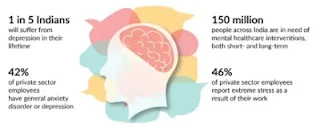With rising awareness about mental health, seeking therapy and counselling has become a vital part of holistic wellbeing. Delhi NCR is home to some of the country’s most trusted and effective mental health centers. Whether you're dealing with depression, anxiety, trauma, or stress, finding the right facility can make a world of difference.
Why Mental Health Support Matters
Mental health issues are just as important as physical ones. They can affect your relationships, productivity, emotional stability, and overall quality of life. In a fast-paced urban region like Delhi NCR, stress and burnout are common—making mental healthcare essential.
Top Mental Health Centers in Delhi NCR
Here’s a curated list of some of the best mental health centers across Delhi NCR based on reputation, service range, experienced professionals, and patient satisfaction:
1. VIMHANS Hospital, New Delhi
Location: Lajpat Nagar, New Delhi
Specialties: Psychiatry, counselling, addiction treatment
Why Choose: Trusted for over 35 years, VIMHANS offers both inpatient and outpatient mental health services and has a team of highly experienced psychiatrists and psychologists.
2. Fortis Escorts – Department of Mental Health & Behavioural Sciences
Location: Okhla Road, New Delhi
Specialties: Anxiety, depression, OCD, child psychiatry
Why Choose: Headed by renowned clinical psychologist Dr. Samir Parikh, the department is known for evidence-based therapies and group interventions.
3. AIIMS – Department of Psychiatry
Location: Ansari Nagar, New Delhi
Specialties: Complex psychiatric disorders, schizophrenia, bipolar disorder
Why Choose: A government institute with affordable treatments and some of the country’s best doctors.
4. Sanjivini Society for Mental Health
Location: Jor Bagh, New Delhi
Specialties: Counselling, community outreach
Why Choose: A non-profit organisation offering low-cost therapy for individuals, couples, and families. Great for those looking for confidential support on a budget.
5. Sukoon Health
Location: Gurugram, Haryana
Specialties: Depression, addiction recovery, inpatient services
Why Choose: India’s first NABH-accredited standalone psychiatric hospital, offering personalised recovery programs in a serene environment.
6. Seraniti by Curefit
Location: Multiple centers in Delhi NCR
Specialties: Online therapy, stress management
Why Choose: Offers modern counselling solutions including online sessions and therapy with licensed professionals at your convenience.
7. Manas Foundation
Location: Greater Kailash, New Delhi
Specialties: Gender-sensitive therapy, legal aid, trauma recovery
Why Choose: Works closely with marginalised communities and the legal system to provide psychosocial support to women and children.
8. Mind Vriksha – Centre for Mental Health
Location: South Delhi
Specialties: Child and adolescent therapy, marital counselling
Why Choose: Highly reputed for dealing with developmental and behavioural issues in children and teens.
9. Mental Wellness Centre – Sir Ganga Ram Hospital
Location: Rajinder Nagar, New Delhi
Specialties: Mood disorders, geriatric psychiatry
Why Choose: Backed by a prestigious multi-speciality hospital, this unit is known for integrating medical and psychiatric care effectively.
What Services Should You Look For?
- Experienced psychiatrists and clinical psychologists
- Evidence-based therapies like CBT, DBT, or trauma-informed therapy
- 24x7 helpline or crisis intervention
- Family and group therapy options
- Online counselling (teletherapy) facilities
How to Choose the Right Centre for You
It’s important to select a mental health facility that aligns with your needs. Here are some questions to consider:
- Are you comfortable with the therapist’s approach?
- Is the treatment personalised?
- Is the location and timing convenient?
- Are the services within your budget or covered by insurance?
Cost and Affordability
Private centres may charge anywhere between ₹800 to ₹3000 per session depending on the expert and service level. Non-profit and government centers like Sanjivini or AIIMS offer subsidised services starting as low as ₹50–₹200.
Real-life Experience
Nikita, a 27-year-old marketing executive from Gurugram, shares: “I was dealing with anxiety and couldn’t cope with work pressure. I reached out to Fortis and within a few months of CBT sessions, my life turned around.”
FAQs
- Do I need a referral to see a therapist? No, most centres allow self-referral.
- Are online counselling sessions effective? Yes, many people find virtual therapy just as helpful, especially for mild to moderate conditions.
- Is my information kept confidential? Yes, registered therapists are legally bound to maintain strict confidentiality.
Conclusion
Mental health is not a luxury—it’s a necessity. Whether you’re experiencing mild stress or severe depression, Delhi NCR offers a wide range of support systems to help you heal and grow. Prioritise your emotional well-being. A healthier, happier you awaits.
Explore Related Articles:
Remember, asking for help is a sign of strength, not weakness.

